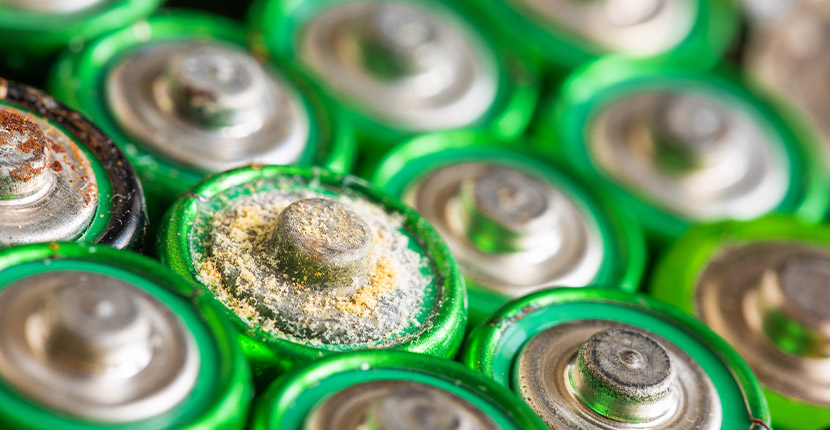Can You Remove Battery Corrosion?
Power - by Bryan Veldboom - updated on 1/12/2022

Have you ever pulled an old toy or other device out of the attic only to find that you left a battery in it by mistake? Then, when you opened up the battery chamber, you probably found a big mess inside. Alkaline batteries can leak when left in a device that you’re not using for too long. That buildup of material you saw inside your device is called corrosion. So, what do you do with a corroded battery? Can you clean corrosion off of a device? We recently spoke with some alkaline industry experts from Energizer about how to deal with battery corrosion. Keep reading for answers to all of your corrosion-related questions, including “What causes corrosion?” “How do you clean off corrosion?” and “How do you prevent corrosion from happening in the first place?”
What Causes Battery Corrosion?
Leaving batteries inside devices that aren’t being used for long periods of time can cause the batteries to leak. The reason for this is that even though the devices aren't being used, the batteries will continue to discharge over time. While this is happening, the build-up of gases inside the battery can seep out through the battery’s vents and cause them to leak potassium hydroxide, more commonly known as battery acid.
How Dangerous is Battery Corrosion?
Battery acid is a dangerous, corrosive material that can cause chemical burns if contact is made with your skin or eyes. Battery acid can also cause damage to whatever device it has leaked into. Be careful to avoid physical contact with any battery corrosion that you encounter.
Does a Corroded Battery Need to Be Replaced?
Once an alkaline battery has corroded, it is no longer safe to use and must be replaced. Before you attempt to remove a leaking battery, be sure to take the proper precautions to avoid being burned. We recommend using a pair of protective gloves and some protective eyewear. Once you have the proper safety gear on, remove the leaking batteries from the device and wipe any battery acid away using a wet rag. When the battery is clean, place it in a plastic bag so it can be recycled. Keep it mind that it is actually against the law to throw away alkaline batteries in some states and counties. You can recycle used alkaline batteries at your nearest Batteries Plus location or drop them off at a recycling center. Please note that fees may apply for recycling and will vary by location.
How Do You Get Corrosion off a Device?
The best way to remove corrosion from a device is to neutralize it with a mild acid like white vinegar or lemon juice. Apply a few drops to a cotton swab and use that to clean off the corrosion. For larger deposits, an old toothbrush dipped in vinegar or lemon juice can be used. When cleaning, be careful that you are only applying the acid to areas where it is safe to do so on the device. Otherwise, you can end up causing additional damage.
After you have finished cleaning the device, allow it to dry completely before putting in new batteries. Keep in mind that if the corrosion has migrated into the circuitry, your device is probably beyond saving and cleaning off the battery contacts will not be enough to restore it.
How Do I Keep My Battery from Corroding?
The easiest way to avoid corrosion is to avoid leaving batteries in devices that you won’t be using for some time. For electronics other than remote controls, a good rule of thumb is to remove alkaline batteries from any devices that won’t be used during the next four weeks.
You should also avoid mixing partially used batteries with new batteries. For items like flashlights, it’s a good idea to replace partially used alkaline batteries after twelve months. It’s also a good idea to avoid mixing different brands of batteries. Mixing battery brands will limit your device’s performance to the lowest capacity battery. The lower performing batteries also have a greater risk of leaking because they can be charged by the higher performing batteries.
Do Extreme Temperatures Make an Alkaline Battery More Likely to Corrode?
Yes. Alkaline batteries will function in temperatures up to 130°F, but are at an increased risk of leaking if subjected to prolonged use above this temperature. Store your batteries in a cool, dry place, ideally between 30°F and 70°F, as this will help prolong their lifespan.
Batteries Plus is Your Battery Headquarters
Batteries Plus has thousands of different batteries, including alkaline batteries from trusted brands like Energizer® and Rayovac®. We also offer additional alkaline batteries that have been engineered specifically for industrial use. Learn more about the best alkaline batteries for your business. Are you looking for a way to dispose of your old batteries? Visit our Recycling Page for more information on the types of batteries and light bulbs our stores accept.
Looking for more information on this topic? We have plenty of useful information in our blogs. Learn about the differences between lithium and alkaline batteries or find out what causes car battery corrosion and how you can prevent it.

